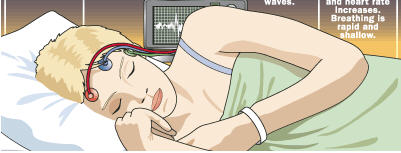Waking and sleeping
 During your waking hours, whether you’re at a desk or taking care of children; or whether you’re seeing friends or getting some “me time”, your body is on the go. You need sleep in order to restore.
During your waking hours, whether you’re at a desk or taking care of children; or whether you’re seeing friends or getting some “me time”, your body is on the go. You need sleep in order to restore.
After all the busy-ness of the day, when finally you sleep, if you’re like many of the women , you’ll often sleep fitfully – your mind is busy processing the day, your body is too full of caffeine, and sometimes alcohol or nicotine, to sleep deeply. A healthy lifestyle begins with healthy waking hours and healthy sleep.
Your sleep-wake cycle is known as a circadian rhythm, and it lasts for approximately 24 hours. In some people, this rhythm is slightly faster – they will tend to wake up early and go to bed early (you may hear them called “larks”). In others the opposite is true – the rhythm is slightly slower, and they sleep late and go to bed late (they’re often called “owls”). Slight variations in the 24-hour cycle aren’t problematic – they’re simply another indication of your individuality. Understanding your sleep-wake cycle, tuning into it, and tying to live by it as much as is practicable is the key to a healthier lifestyle – most importantly, it’ll ensure you’re getting the right amount of sleep to function optimally during the day.
There are all sorts of ways in which modern living upsets the body’s natural, daily rhythm. One of the greatest culprits is stress. Modern life is full of stressors – from little things such as traffic jams to life-changing things such as moving to a new house. While you can probably take steps to minimize stress in your life, you won’t ever eradicate it. Instead, you have to give your body the chance to deal with stress effectively.
Try to end each day with a going-to-bed routine that enables you to “let go” of the day’s stresses. This may be a simple visualization in which you imagine freeing yourself from stress; or it may be a more active metaphor for letting go – perhaps washing your face before bedtime and imagining that the stress of the day is flowing away with the water. One of the favorite ways to relax is to add a few drops of bergamot or lavender aromatherapy oils to a warm bath just before bedtime, and to soak in the bath for 20 minutes or so. A cup of chamomile tea or the herbal remedies valerian or passionflower can encourage relaxation, too.
Steer clear of caffeine in all its guises – ideally all day, but if you find this difficult, drink your cups of coffee or tea in the morning only. Nicotine and alcohol are stimulants, too – and although you might think that a nightcap lulls you to sleep, it actually damages the quality of that sleep.
Although you don’t’ have to plan your day around making sure your night is wholesome, do be aware that certain activities during the day will help improve your sleep. Regular exercise (even as little as 20 minutes a day) can have a beneficial effect. Aim simply to raise your heart rate a little and so raise your temperature (incidentally, falling temperature brings sleep more easily). Mid-afternoon is the best time to exercise, so perhaps take the stairs at work instead of the elevator, or have a brisk walk around the block. Do what you can in the time you have available.
The right amount of sleep
In 2009, Carnegie Mellon University in Pittsburgh published results of a sleep study showing that people who slept seven hours a night were three times more susceptible to a cold virus than those who got eight hours. The results confirmed the theory that how much you sleep has dramatic effects on your immunity.
Too little sleep can also result in weight gain. Chronic sleep deprivation (in which you never get a good night’s sleep) can make you feel hungrier than normal and affect the way your body processes and stores carbohydrates. It may also take the enjoyment out of life and result in irritability, impatience, inability to concentrate, and loss of memory. In addition, sleep disorders have been linked to high blood pressure (hypertension), increased stress hormone levels, irregular heartbeat, and even cancer.
And there’s more. Most cells of your body are renewed during sleep, so if you don’t’ get enough you’ll age faster – there really is such a thing as beauty sleep.
However, before you take to your bed, note that extended bouts of sleep aren’t the answer. A number of people find that if they “sleep in” on weekends they feel groggy and can even wake up with a headache. The answer lies in going to be earlier and rising at the same time each day. In all, aim for around eight hours of sleep a night.

